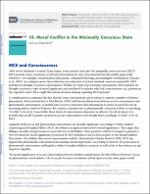Finding Consciousness
The Neuroscience, Ethics, and Law of Severe Brain Damage
| dc.contributor.editor | Sinnott-Armstrong, Walter | |
| dc.date.accessioned | 2021-04-15T02:02:59Z | |
| dc.date.available | 2021-04-15T02:02:59Z | |
| dc.date.issued | 2016 | |
| dc.date.submitted | 2021-04-14T11:43:46Z | |
| dc.identifier | https://library.oapen.org/handle/20.500.12657/47840 | |
| dc.identifier.uri | https://directory.doabooks.org/handle/20.500.12854/64617 | |
| dc.description.abstract | Modern medicine enables us to keep many people alive after they have suffered severe brain damage and show no reliable outward signs of consciousness. Many such patients are misdiagnosed as being in a permanent vegetative state when they are actually in a minimally conscious state. This mistake has far-reaching implications for treatment and prognosis. To alleviate this problem, neuroscientists have recently developed new brain-scanning methods for detecting consciousness in some of these patients and even for asking them questions, including “Do you want to stay alive?” These new technological abilities raise many questions about what exactly these methods reveal (Is it really consciousness?), how reliable they are (Do they fail to detect consciousness in some patients who are conscious?), what these patients’ lives are like (Do they feel pain?), what we should do for and to these patients (Should we let them die?), who should decide (Are these patients competent to decide for themselves?), and which policies should governments and hospitals enact (Which kinds of treatment should be made available?). All of these questions and more are addressed in this collection of original papers. The prominent contributors provide background information, survey the issues and positions, and take controversial stands from a wide variety of perspectives, including neuroscience and neurology, law and policy, and philosophy and ethics. This collection should interest not only academics but anyone who might suffer brain damage, which includes us all. | |
| dc.language | English | |
| dc.relation.ispartofseries | Oxford Series in Neuroscience, Law & Philosophy | |
| dc.rights | open access | |
| dc.subject.classification | thema EDItEUR::P Mathematics and Science::PS Biology, life sciences::PSA Life sciences: general issues::PSAN Neurosciences | en_US |
| dc.subject.other | consciousness, vegetative state, minimally conscious state, death, disability, pain, brain damage, neuroscience, fMRI, ethics | |
| dc.title | Finding Consciousness | |
| dc.title.alternative | The Neuroscience, Ethics, and Law of Severe Brain Damage | |
| dc.type | book | |
| oapen.identifier.doi | 10.1093/acprof:oso/9780190280307.001.0001 | |
| oapen.relation.isPublishedBy | db4e319f-ca9f-449a-bcf2-37d7c6f885b1 | |
| oapen.relation.hasChapter | f5cefff1-6881-4bf2-9485-417628de02ab | |
| oapen.relation.isbn | 9780190280307 | |
| oapen.place.publication | Oxford |
Files in this item
| Files | Size | Format | View |
|---|---|---|---|
|
There are no files associated with this item. |
|||
This item appears in the following Collection(s)
Chapters in this book
-
(2016)In the next section, I sketch a view in which the possession of phenomenal consciousness (henceforth: “consciousness”) is necessary for possession of (positive or negative degrees of) subjective well-being. It would seem ...

